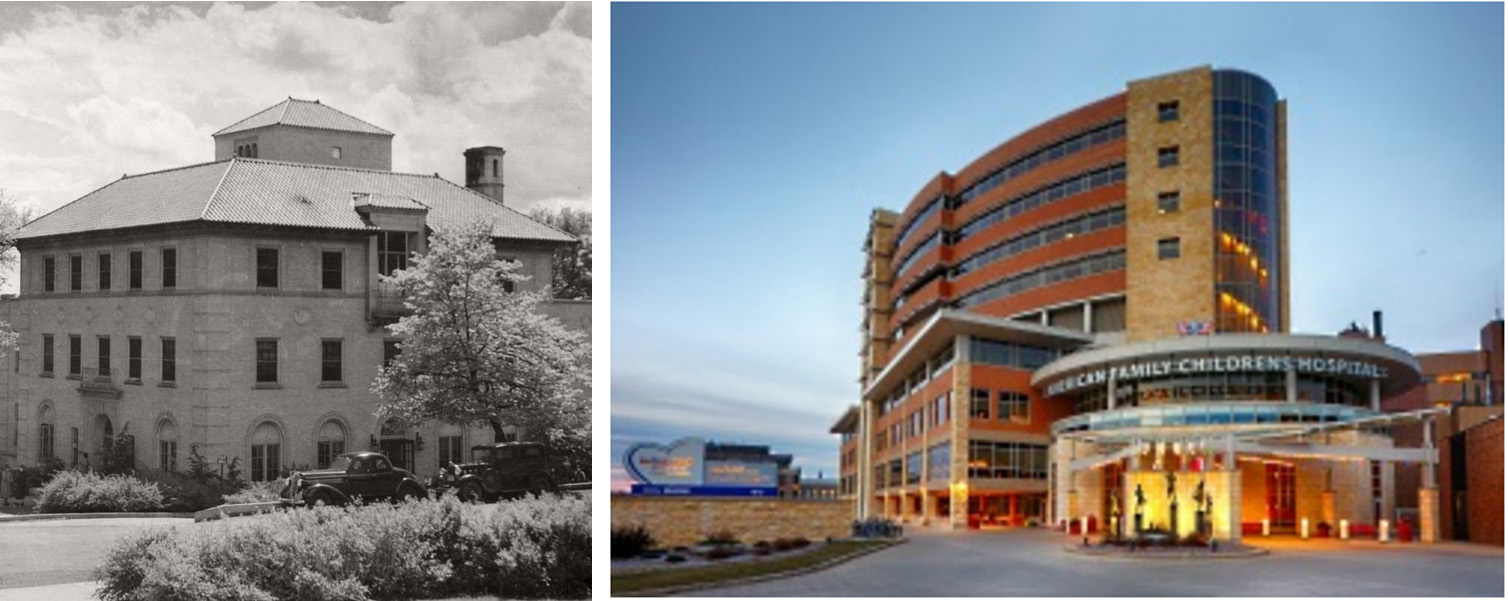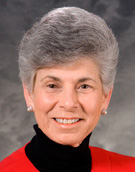The early history of Pediatrics at the University of Wisconsin School of Medicine and Public Health began with the creation of the Section of Pediatrics in the Department of Medicine with Director John Gonce, MD, and three faculty members. In 1932, Gonce was named the first professor of pediatrics, and in 1957 — a year after his death — the school created the Department of Pediatrics. Throughout its history, our department’s faculty have dedicated themselves to providing excellent patient care, educating the next generation of physicians, and forging cutting-edge discoveries in basic and clinical research to improve the health of children.
In 1920, the Mary Cornelia Bradley Hospital for the Study of Children’s Diseases opened as the first freestanding children’s hospital in Madison, Wisconsin. For many years, care for hospitalized children was divided among three separate locations throughout the city. When the Bradley Hospital became too small for patient needs, care for all pediatric patients was consolidated to a four-story building on Linden Drive in 1957, and the building was renamed the University of Wisconsin Children’s Hospital. The Clinical Sciences Center opened on the far west side of the UW–Madison campus in 1979, providing a new home for the University of Wisconsin Children’s Hospital within the University of Wisconsin Hospital and Clinics.

August 2007 marked the opening of the American Family Children’s Hospital (AFCH), a freestanding, state-of-the-art facility designed around the needs of children and their families. American Family Children’s Hospital was ranked among the top 50 children’s hospitals in six medical and surgical specialties in U.S. News and World Report’s 2018-2019 Best Children’s Hospitals Guide.
About the American Family Children’s Hospital:
- Level 1 Pediatric Trauma Center
- Level IV Neonatal Intensive Care Unit (NICU)
- Pediatric Intensive Care Unit (PICU)
- Verified Pediatric Burn Center
- Dedicated pediatric imaging and pediatric hybrid cath/angio suites
- 24/7 Child Life services to ease anxiety and help kids be kids while in the hospital
- Hospital-based school, staffed by Madison Metropolitan School District teachers
- Positive Image Center to ease anxiety from appearance-altering
illnesses - Facility dogs, pet therapy, music therapy, family dinners, and sibling
childcare to ease stress on patients and families
Today’s American Family Children’s Hospital is a comprehensive pediatric medical and surgical center staffed by nationally recognized faculty who provide world-class care for a wide range of specialties. The hospital offers care in a modern facility with advanced technology that is also a national model for family-centered care to provide the best possible environment for children to heal.
Learn more about American Family Children’s Hospital.
Recent Growth
Ellen Wald, MD, an expert in pediatric infectious diseases, became the Department of Pediatrics’ sixth chair in 2006. She was the first woman selected to chair a department in the University of Wisconsin School of Medicine and Public Health.
The department experienced transformative growth under Wald’s leadership. The number of faculty in the department more than doubled (from 90 members in 2006 to 208 in 2022) and extramural research funding grew from $14.6 million in 2007 to $52.2 million in 2022.
During Dr. Wald’s tenure, the Department of Pediatrics introduced and expanded several clinical programs to better serve children and families in Wisconsin and beyond.
Pediatric Hospitalist Program
Recognizing the importance of providing coordinated patient- and family-centered care, Wald spearheaded the creation of a pediatric hospitalist program at American Family Children’s Hospital. The division was one of the first such programs in the nation. It is now a board-certified subspecialty and welcomed its first fellow in 2022.
Care for Children with Medical Complexity
Children with complex medical conditions comprise a small but growing group of patients with multiple serious medical issues. These patients have an enormous impact on our health care system due to the time and resources required to care for their medical needs. Mary Ehlenbach, MD, and Ryan Coller, MD, MPH, recognized these patients and their families faced many challenges to receiving optimal health care and spearheaded the design of a comprehensive, multi-specialty program to provide coordinated primary and specialty care for these children. Our faculty are also working to ensure a smooth transition for patients with chronic conditions to move from pediatric to adult care.
Pediatric Heart Program
The pediatric cardiology and heart surgery program is nationally recognized. It has an outstanding interventional service that provides care for complex pediatric patients as well as adults with congenital heart disease. The program recently received accreditation by the national Adult Congenital Heart Association.
Pediatric Cancer Program
Our children’s cancer center is part of the University of Wisconsin Carbone Cancer Center, one of a small number of select centers nationwide designated by the National Cancer Institute to be comprehensive. Researchers in our Division of Pediatric Hematology, Oncology, and Bone Marrow Transplant are dedicated to developing novel, cutting-edge treatments for childhood cancer. In 2013, the division was selected as one of seven institutions to join North America’s only pediatric cancer “Dream Team,” to collaboratively advance the study of immunotherapy and accelerate development of new cancer therapies. Several highly specialized treatments for pediatric cancers, especially for leukemia and neuroblastoma, were developed here.
Care for preterm and acutely ill infants
The members of our Division of Neonatology and Newborn Nursery provide care for some of our sickest and most vulnerable patients in two NICUs, including the Level IV NICU at American Family Children’s Hospital. Our patients come from throughout the state and region, transported by ground or air by UW Health Med Flight, a team with extensive experience caring for critically ill infants and children.
Pediatric Allergy Program
Our providers are focused on improving therapies for childhood allergies and asthma. Faculty in the Division of Pediatric Allergy, Immunology, and Rheumatology are nationally recognized and lead some of the premier research programs in the U.S., including the Children’s Respiratory and Environmental Workgroup, which is collecting standardized data from 10 birth cohorts around the country to better understand environmental causes of allergic disease and asthma.
Transition
In fall 2021, Wald indicated to leadership her desire to step down from the position of department chair and return to the faculty to focus on research and teaching.
Robert Golden, MD, dean of the University of Wisconsin School of Medicine and Public Health, named Megan Moreno, MD, MSEd, MPH, vice chair of academic affairs and professor in the Division of General Pediatrics and Adolescent Medicine, as interim chair, a position she assumed on January 1, 2023. Moreno is an adolescent medicine physician interested in complex medical conditions and the intersection of physical and mental health among adolescents. Her nationally recognized research program examines adolescent health and technology.
A search for the next chair of the Department of Pediatrics commenced in September 2023.
Department Chairs: 1957-2022
Each Department of Pediatrics chair has overseen prodigious growth through decades of medical breakthroughs, increased numbers of faculty and learners, and advances in research.
 |
1957–1963: Nathan Smith, MD. A graduate of what was then known as the University of Wisconsin Medical School, Smith was an associate professor of pediatrics at the University of California, Los Angeles, before becoming the department’s first chair. |
 |
1964–1974: Charles Lobeck, MD. Lobeck specialized in cystic fibrosis research and patient care. In 1975, he became dean of the University of Missouri Medical School, and later returned to the University of Wisconsin Medical School as vice dean. |
 |
1975–1984: William Segar, MD. An expert in fluid and electrolyte metabolism and pediatric fluid therapy and dialysis, Segar was a driving force in building the UW’s pediatric renal service. |
 |
1985–1995: Philip Farrell, MD, PhD. Farrell is an international expert on cystic fibrosis research and patient care, as well as newborn screening. He was the dean of the University of Wisconsin School of Medicine and Public Health from 1995 to 2006. |
 |
1996–2005: Aaron Friedman, MD. A former department resident and fellow, Friedman joined the faculty in 1981 as a pediatric nephrologist. He was the dean of the University of Minnesota Medical School from 2011 to 2013. |
 |
2006–2022: Ellen Wald, MD. Under Wald’s leadership, the department experienced tremendous growth in both clinical and research programs. An expert in pediatric infectious diseases, Wald remained active in research and teaching throughout her tenure. |
